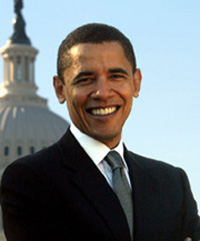Law graduate Obama got his start in civil rights practice
Attorney Judson Miner called Harvard to offer a job to a graduating student named Barack Obama and did not expect to be showered with gratitude. Still, he was not expecting the reception he got.

"You can leave your name and take a number," the woman who answered the phone at the Harvard Law Review said breezily. "You're No. 647."
That was 1991 and even then Obama - the Illinois senator now seeking the Democratic presidential nomination - was a hot commodity.
As the first black president of the Harvard Law Review, Obama had his pick of top law firms. He chose Miner's Chicago civil rights firm, where he represented community organizers, discrimination victims and black voters trying to force a redrawing of city ward boundaries.
Like many lawyers, Obama never took part in a trial. He spent most of his nine-year career working as part of a team, drawing up contracts, briefs and other legal papers.
The firm of Miner Barnhill & Galland, many of whose members have Harvard and Yale law degrees, has a reputation that fits nicely into the resume of a future presidential candidate.
"It's a real do-good firm," says Fay Clayton, lead counsel for the National Organization for Women in a landmark lawsuit aimed at stopping abortion clinic violence. "Barack and that firm were a perfect fit. He wasn't going to make as much money there as he would at a LaSalle Street firm or in New York, but money was never Barack's first priority anyway."
The firm offered another advantage to Obama. It was close to the political action.
Miner was Chicago's corporation counsel under Harold Washington, the city's first black mayor, in the 1980s when Washington was battling for control of the City Council against remnants of the once-mighty Machine.
Miner introduced Obama to a number of people in politics. Obama already knew many others, having worked as an organizer in the black community before he entered law school.
Obama was part of a team of attorneys who represented the Association of Community Organizations for Reform Now (ACORN) in a lawsuit against the state of Illinois in 1995 for failing to implement a federal law designed to make it easier for the poor and others to register as voters.
A federal court ordered the state to implement the law.
Obama also wrote a major portion of an appeals brief on behalf of a whistleblower who exposed waste and corruption in a research project involving Cook County Hospital and the Hektoen Institute for Medical Research and alleged that she was fired in retaliation.
The case was settled out of court. The county agreed to pay the federal government $5 million, part of which went to the whistleblower, Dr. Janet Chandler. Hektoen agreed to pay $500,000 to the government plus $170,000 to Chandler for wrongful termination.
And Obama was part of a team of lawyers representing black voters and aldermen that forced Chicago to redraw ward boundaries that the City Council drew up after the 1990 census. They said the boundaries were discriminatory.
After an appeals court ruled the map violated the federal Voting Rights Act, attorneys for both sides drew up a new set of ward boundaries.
Public records at the Illinois Attorney Registration and Disciplinary Commission - which handles ethical questions concerning the state's lawyers - indicate there were no complaints against attorney Obama.
Obama's legal work fell off sharply in 1997 after his election to the Illinois Senate.
"On his second day down in Springfield he called me and said, 'Don't pay me - this is a full-time job,"' Miner recalls.
Obama agreed to work for the firm in summer when the legislature was out of session. His law license became inactive in 2002 as politics took over.
For all his passion for civil rights, Obama did have a bit of experience working in a large firm with big corporate clients. In 1988, he was a summer associate at the big Chicago firm now known as Sidley Austin.
Like most summer associates, he worked on research projects.It was there that he met Michelle Robinson, a young Harvard law graduate assigned as his mentor at the firm. They were married four years later.
Neither Obama lingered in corporate law. She stayed with the firm for three years and moved on. She is now a vice president at the University of Chicago.
Besides his practice, Barack Obama taught constitutional law at the University of Chicago.
"He was very engaging, approachable and human," recalls Patrick Jasperse, now a Justice Department trial attorney based in Washington, the AP says.
Obama's view of the law was shaped in part by his years before law school as a community organizer working with the poor in Chicago's housing projects.
In his 1995 book, "Dreams From My Father," he said the law could sometimes be "a sort of glorified accounting that serves to regulate the affairs of those who have power - and that all too often seeks to explain, to those who do not, the ultimate wisdom and justness of their condition."
"I try to do my small part in reversing this tide," he wrote.
Subscribe to Pravda.Ru Telegram channel, Facebook, RSS!


